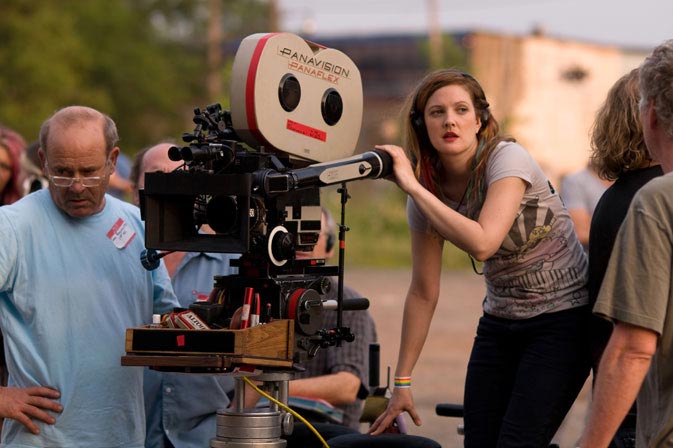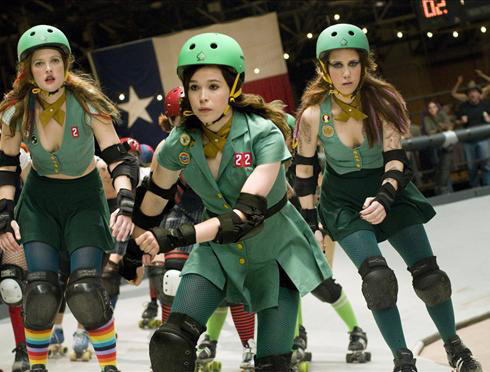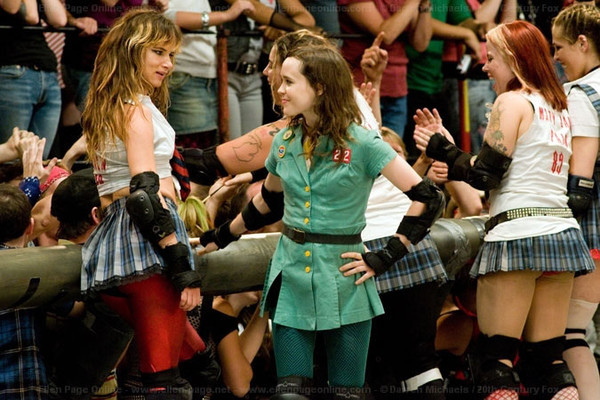 Not to sound all stalker-ish or anything, but I really do think I have some weird psychic connection to Drew Barrymore. Like if we weren’t doing what we do and met randomly, we’d be good friends. We are both blondes (usually) who like to twist our hair, have cute lisps, are accident-prone and definitely go for the quirky, nerdy types who make us laugh. Of course, I’m slightly older than she and didn’t have the very messed up childhood that she did, but I’m just saying … in another time and place, we’d be like THIS [fingers crossed].
Not to sound all stalker-ish or anything, but I really do think I have some weird psychic connection to Drew Barrymore. Like if we weren’t doing what we do and met randomly, we’d be good friends. We are both blondes (usually) who like to twist our hair, have cute lisps, are accident-prone and definitely go for the quirky, nerdy types who make us laugh. Of course, I’m slightly older than she and didn’t have the very messed up childhood that she did, but I’m just saying … in another time and place, we’d be like THIS [fingers crossed].
Just from the Whip It trailer alone, I knew Drew picked the absolute right film for her directorial debut – a debut, mind you, that is long in coming given the vast experience this woman has had in the industry, as an actress and as a producer, with mentors like Steven Spielberg to give her tips. Thankfully, I was right about the film, a delightful finding-yourself-heart-tugger about a wayward Texan teenager (Ellen Page), whose mother wants her to be a beauty queen but who discovers her true passion: roller derby. Whip It just screams Barrymore.
So, I was more than a little excited to meet and talk with her, but at our little table of journalists, we were told we only had five minutes with Drew. Collectively, we groaned, but we shouldn’t have worried. In that short period of time, she managed to pack it in, giving us some great insights on why she picked this project, her aversion to the Hollywood ending and using her clumsiness to its full effect onscreen.
Step 1: Remember, it’s not just a sports movie; it’s personal.
“I think there are two aspects to this film that are the most central themes: the roller derby — finding your tribe, empowering yourself, being your own hero, and also the mother-daughter love story. I wanted to find a film I could really make personal for me. I didn’t want to be a director telling a story, I wanted to be a person who could take all the emotional experiences I’ve had, cultures I’ve learned. The music I’ve loved. The films I’ve studied. The nature of how a film works through being a producer for 15 years. And really just apply that into something that could be not just a movie to me but really my heart. This story really fit the bill because my heart is something that doesn’t like heaviness; I don’t want to watch strum and drang amongst a family. That said, I  like comedy but I find when comedy has heart, it’s all the more funny and poignant to me.”
like comedy but I find when comedy has heart, it’s all the more funny and poignant to me.”
Step 2: Form your own tribe.
“I feel with my own friends, they’ve been so great and honest with me along the way. They’ve supported me and encouraged me but have also said, ‘Hey, I think you’d to check yourself there or I think you’re repeating a pattern there.’ I think these women are to Ellen [Page], they way my friends are to me.”
Step 3: Connect the dots.
“I really related to the metaphor of [beauty] pageants and Hollywood. I was very surprised when I did research on pageant in film, dating back to the ’60s. It’s always parodied. [But the beauty pageant] is really not that at all. It’s a rite of passage, a door-opener, a way of life. It’s just not right for [Ellen Page’s] character. And I feel the same way about Hollywood. There’s a lot of aspects of it that aren’t wrong, they’re just not right for me. I don’t think you should have a perfect body shape or live a certain lifestyle. Or have to act a certain way or its taboo. This perfectionism is impossible to live up to. I found out, wow, I’m more like a derby type of girl. I want to go out there and kick butt and have a sense of humor. Enjoy my life and not be afraid of what other people think. Try and be empowered by that. So, I just found a movie I could really relate to and put myself into this. “
Step 4: Forget the typical Hollywood ending.
 “I worked really hard not to make it a Hollywood ending. Life goes on. In my 20s, I was obsessed with happy endings, which was great. A fairytale aspiration for me, and I liked telling those kinds of stories. But in my 30s, I’m like a good day is a GOOD DAY. It was great as a director for me to see a young girl’s side of it AND the parent’s side. In my mid-30s, I understand a parent who wants the best for their child. They may come from a different generation or may not be seeing eye to eye, that doesn’t mean they are a bad person. I didn’t want to villainize them. I kept trying to take the archetypal aspect or the Hollywood aspect out of it. By the end – through lying, cheating, stealing and doing everything they can to finally having everything fall apart – to be honest about it and have some moment of peace in their family. And to me that is a great triumph.
“I worked really hard not to make it a Hollywood ending. Life goes on. In my 20s, I was obsessed with happy endings, which was great. A fairytale aspiration for me, and I liked telling those kinds of stories. But in my 30s, I’m like a good day is a GOOD DAY. It was great as a director for me to see a young girl’s side of it AND the parent’s side. In my mid-30s, I understand a parent who wants the best for their child. They may come from a different generation or may not be seeing eye to eye, that doesn’t mean they are a bad person. I didn’t want to villainize them. I kept trying to take the archetypal aspect or the Hollywood aspect out of it. By the end – through lying, cheating, stealing and doing everything they can to finally having everything fall apart – to be honest about it and have some moment of peace in their family. And to me that is a great triumph.
Step 5: Direct AND act; it’s easy.
“It would have been easier on some levels because juggling pre-production while training and doing all of that, but for me, I felt it would have been more difficult because I’m not a sideline dictator. I like to know what the girls are going through, and I know the value of a training camp having to go through one for Charlie’s Angels movies. Actors doing their own stunts, I wanted to be in the trenches with them. I’ve never really related to those directors who seem like they are at the top of the pyramid. I feel like directors who are really, you know … they may be coaches to the team but they’re a TEAM.”
Step 6: Don’t sweat the bruises and concussions.
“Yeah, I did [get hurt]. But I hurt myself walking down the street, so I might as well put it to some good use.”


Who you callin’ a “quirky nerdy type,” bitch?